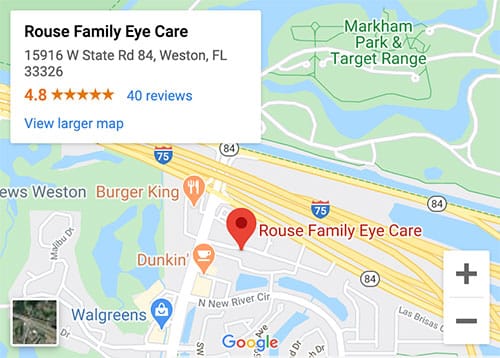What in the World is Keratoconus?
Your cornea is the clear, round window through which light is focused into the eye so you can see. Changes to the shape of your cornea can cause vision problems and sensitivities. Such is the case with keratoconus, a condition characterized by an outward-facing, cone-shaped bulge in the cornea that distorts vision. Vision distortions can make daily tasks difficult and even dangerous. If you experience any vision changes, schedule an appointment with our Weston, FL eye doctors at Rouse Family Eye Care right away.
What Causes Keratoconus
It isn’t clear what causes keratoconus, but eye doctors usually diagnose it between the teenage years and people in their 30s. Although scientists have not yet confirmed a cause for keratoconus, it seems to have a genetic link and is more common in people who rub their eyes a lot. So, it occurs more often for people with eye allergies and connective tissue disorders like Ehlers-Danlos syndrome.
Symptoms of Keratoconus
Keratoconus symptoms may manifest gradually, or suddenly. It typically affects both eyes, but can also occur in just one eye. This is why regular checkups, from childhood, with your Weston eye doctors are important. Early-stage keratoconus can be treated more successfully than the late-stage condition. Symptoms include:
- Slightly blurry vision that progressively gets worse or is difficult to correct
- Seeing halos or glare around lights
- Poor night vision
- Double vision
- Eye irritation and headaches
- Light sensitivity
- A sudden clouding of vision
These symptoms may also have other causes as well, so it’s crucial to address any eye problems or vision disturbances with your eye doctor promptly.
Keratoconus Treatment in Weston, FL
If you are diagnosed with keratoconus, treatment will depend on how early, mild, or severe the disease is. The first line of defense, however, is this: do not rub your eyes. Other treatments include:
- Glasses or soft contact lenses: These can help correct vision in early-stage keratoconus, but prescriptions will need to change as the shape of the cornea changes.
- Hard contacts: As keratoconus advances, gas-permeable hard contacts may be necessary. Your Weston eye doctor may recommend piggybacking a hard lens on top of a soft lens for comfort.
- Hybrid lenses: A type of contact lens that rests on the sclera (white part of the eye), covering the cornea without actually touching it.
- Intacs: This is a small, inwardly-curving device your eye doctor may surgically implant into your cornea to normalize the curve of your cornea and improve your vision.
- Corneal cross-linking: A combination UV-light, riboflavin eye drop procedure that can help stabilize the cornea in the early stages of the disease.
- Keratoplasty (corneal transplant surgery): For severe cases of keratoconus, your corneal tissue may be replaced by healthy corneal tissue from a donor.
See the Eye Doctors Weston, FL Residents Rely On
If you live in Weston, FL, and have any keratoconus symptoms, please schedule an appointment with Rouse Family Eye Care as soon as possible to have our eye doctors evaluate and diagnose your eye condition and provide the treatment you need to improve your vision and eye health.





Leave a Reply
Want to join the discussion?Feel free to contribute!